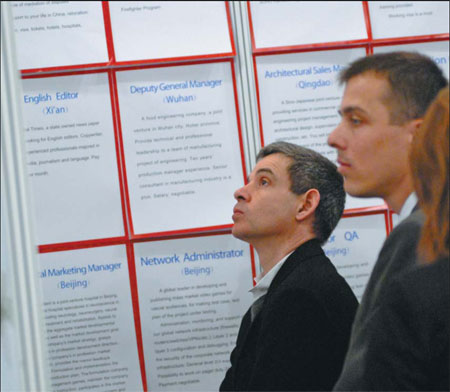Global drive helps recruiters thrive
Updated: 2015-07-24 08:09
By Chen Yingqun(China Daily Europe)
|
|||||||||||
 |
|
In the world of headhunting, carefully assessing personalities plays a role. Provided to China Daily |
Fitting in
Cultural integration is the most challenging aspect of recruitment for Chinese companies, as there are differences between the working cultures in China and the West, while many private Chinese companies also have their own unique cultures.
Huang has worked with many large Chinese companies, including Huawei Electronics Co Ltd, Baidu Inc and Lenovo Group. He says the most important goal for a Chinese enterprise is to find someone who can integrate well with the team and perform in an ever changing business environment.
"For example, if Huawei wants to find some research and development talent in Silicon Valley, it's easy to identify candidates with the right skills, but evaluating whether they could perform well in Huawei's company culture is difficult," he says. "So if you think a foreign expert is good but find out they would struggle to get used to China's culture or the company's corporate environment, you have to let the client and the candidate know." He considers a job well done only after a candidate spends two years with a company and has performed well. "If you put high-level people in a company where they can't get on, it hurts both sides. A good consultant will always get a lot of repeat business."
Huang, who was Born in Shanghai and went to New York at age of 14, joined Heidrick & Struggles a year and half ago. He says the most important thing in recruitment is helping a candidate make the right choice, giving them advice on what kind of person the client is looking for and what to take into account before changing career.
"This is our real job; not only recruitment, but identifying the right candidate, giving them advice on how to plan their career, when to change jobs. It's an advisory role, not only to our clients, but also to the candidates," he says. "You have to know about all your candidates, their career history, family situation. They place their trust in you, and you have to take it very seriously and care for them."
As the Chinese recruitment market has changed, so too have the companies' requirements for the talent. For example, Huang says every industry is now talking about digital convergence, so executives with experience and skills in convergence are more in demand.
"In the past, if a company wanted a chief marketing officer, they would want someone who knows about branding. Now, they want someone who knows about branding, and also has a technical background and can understand big data," he says. "So when choosing candidates, experience is less important and their passion and quick-learning agility and capacity becomes more essential."
Duan adds that in the past few years, the demand for talent has grown tenfold, and supply has been unable to keep up with demand. That is why, in China, people at management level are often younger than their Western counterparts.
Van den Boer says this year he feels there is more competition in China's HR market, as the industry has become more valued, and that there are not only multinational headhunting companies battling it out for business, but also more and more local service providers.
"It's a competitive business," he says. "In Europe, it's really easy (for a company) to say in January that they want this person on board in July. We can make a plan for that to happen. But in China, in June, somebody resigns and that company will want somebody else to replace them in two weeks. The pace is much faster."
Early on, when the industry was still new to Chinese companies, recruitment agencies were able to build their business easily, he says. Today, however, recruiters increasingly need to specialize in order to develop market share.
"If you don't grow with the market, if you don't build your company, if you don't focus, it is harder," he adds. "It's not about just coming in and getting a piece of the pie."
chenyingqun@chinadaily.com.cn
Today's Top News
Discovery of Earth-like planet disappoints Chinese Web users
Turkish warplanes destroy IS targets
Financial Times sale – the deal no-one saw coming
Deficit hits $104b in first half
Warriors star in lakeside opera spectacular
Greek parliament passes crucial bailout bill
Astronomers discover most Earth-like planet yet
Ministry: No date set for nationwide two-child policy
Hot Topics
Lunar probe , China growth forecasts, Emission rules get tougher, China seen through 'colored lens', International board,
Editor's Picks

|

|

|

|

|

|






